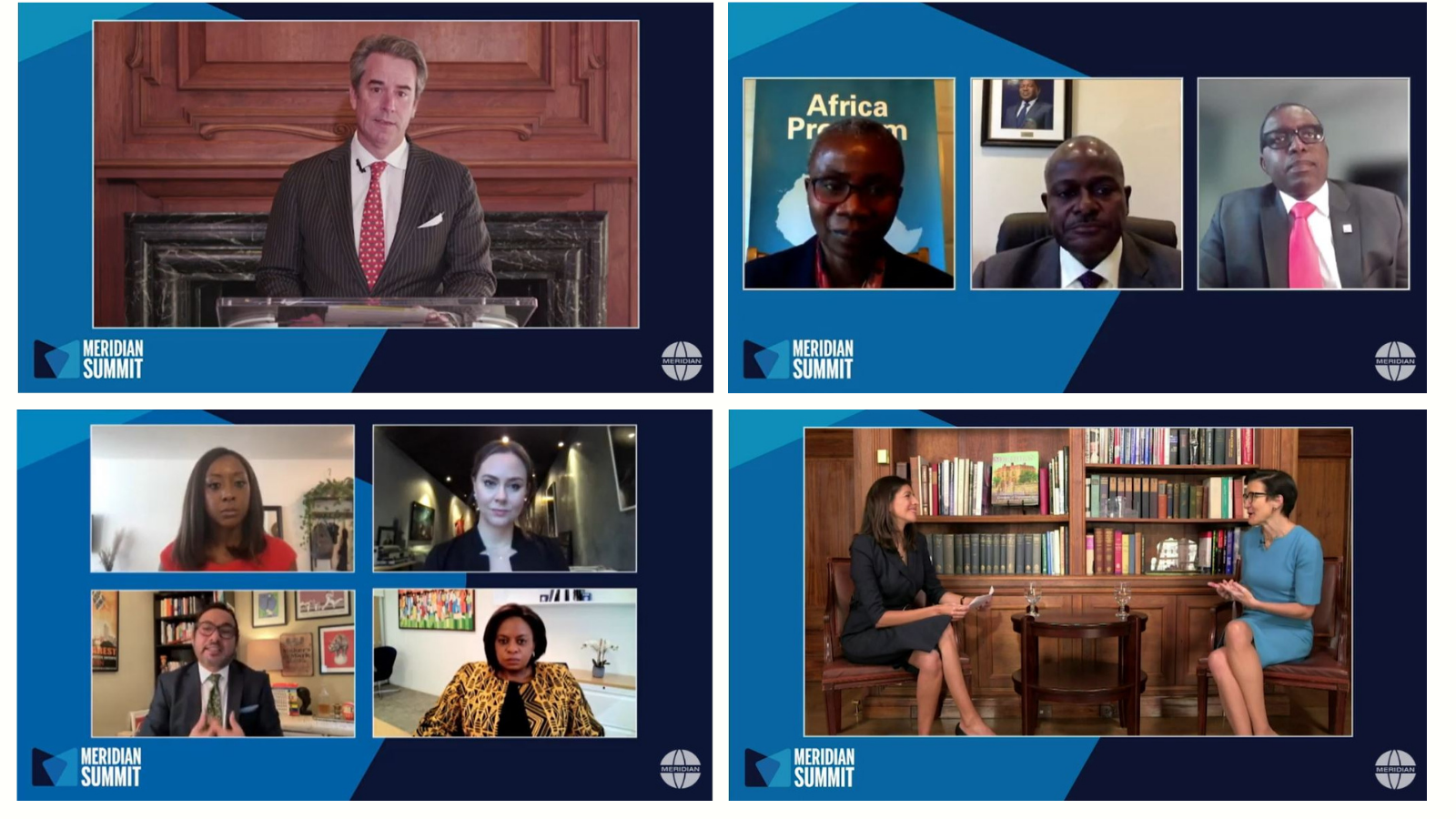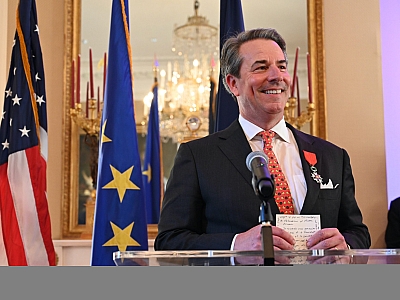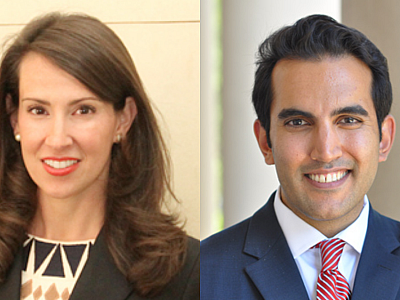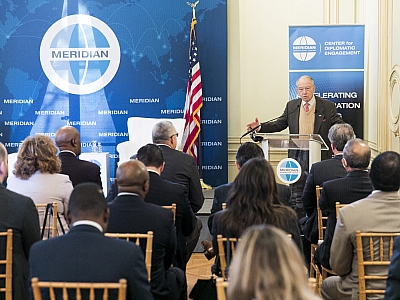Meridian Holds Summit At Crossroads of Diplomacy and Environmental, Social, and Governance (ESG) Issues

Meridian International Center hosted the 10th Annual Meridian Global Leadership Summit on October 22 to a live global audience of over 400. The fully virtual gathering featured 50 speakers over the course of an eight-hour program, which zeroed-in on how governments, businesses and private sectors in the U.S. and around the world are tackling today’s greatest problems through an increasingly-relevant Environment, Social, and Governance (ESG) lens.
Meridian CEO Ambassador Stuart Holliday opened the program with a release of Meridian’s inaugural Corporate Systemic Responsibility report. The new analysis argues for a systems-based approach to corporate social responsibility (CSR) that allows both companies and countries to responsibly invest in sustainable solutions across borders, cultures and sectors. He later returned to present the Meridian Global Leadership Awards.
Citi served as the Corporate Chair of the event, while ServiceNow and CoStar group were Global Engagement Chairs. Bloomberg Live was the media partner. Here are some highlights.
ENVIRONMENT
The climate crisis was one of the principal themes of the program. U.S. Deputy Secretary of Energy David Turk underscored that the mood on environmental policy is “positive” going into COP26 because of significant progress on Capitol Hill and the Reconciliation Bill in Congress. He sees the U.S. re-engaging in clean energy technology cooperation across key sectors and technologies, and that this has the power to benefit individuals, businesses, and foreign governments alike. He underscored that if the U.S. reduces costs for clean energy, it will also reduce costs for the world, especially in emerging technologies.
NATO Deputy Secretary General Geoană discussed how NATO has been sticking together to work with the 30 governments of the alliance to combat climate change. He underscored that this is a “huge challenge” that is “for all of humanity” and stated that NATO is also working with multilateral organizations to see how to measure analytical progress and failures for climate change in the defense sector.
Ambassador of Italy to the U.S. Mariangela Zappia provided a primer for the upcoming G20 meeting and COP26. President of the G20 and Co-host of COP26 alongside the United Kingdom, Italy has chosen the motto People, Planet, and Prosperity and put forward multilateralism as the only way to address our climate challenges.
At a session on sustainable supply chains and conscious procurement, Project X Global CEO Marcela Navarro highlighted the need to make adoption targets public. With COP26 coming up, she noted it is a unique opportunity to move from an innovation push to a procurement pool and this can be done through making the targets for adoption public.
On the business side, Citi Bank’s Global Head of Trade Production Strategy Donna McNamara shared how Citi is working with the International Finance Corporation (IFC) to provide lower financing to the spice company for hitting key ESG metrics. This turns into a win-win-win situation for buyers and sellers along the supply chain. It also provides McNamara with the business motivation to take sustainability seriously.
From the international view, Paulson Institute Vice Chair Deborah Lehr provided unique insights into China’s regional pilot programs and attempts to create a national carbon market. China’s strategy is to move from sector to sector at the regional level before implementing their plan nationally. Asian Development Bank’s Suzanne Gaboury discussed how various businesses and countries across Asia are implementing sustainable finance solutions and where there are opportunities across the region.
SOCIAL
The Meridian Summit held multiple sessions regarding the “S” in ESG including a fireside chat with Congresswoman Young Kim (R-CA). She discussed human and women’s rights issues in various countries, including Afghanistan, North Korea and China. In conversation with Ambassador Piper Campbell, Congresswoman Kim noted, “I firmly believe that human rights should play a central role in foreign policy and that our government should be working tirelessly to provide a voice for the voiceless and provide justice for the oppressed around the world.”
President and CEO of the Center for American Progress Patrick Gaspard provided a unique perspective on equity, justice and human rights within the State Department and the U.S. government. He highlighted that the creation of the Office of Diversity and Inclusion is a great start, but now it needs to provide recommendations. Ambassador Gaspard called for greater diversity in leadership within the U.S. Foreign Service, as well.
Founder and CEO of the Responsible Business Initiative for Justice (RBIJ) Celia Ouellette urged businesses to take a stand on human rights and to do so at local, state, and national levels. She argued that businesses do “care” about issues of equity and justice, but they need a hand in understanding. This is being done through organizations like hers that create partnerships between organizations and businesses that are willing to work with governments to tackle social justice reforms.
Twitter’s Reggie McCrimmon and the World Bank’s Isha Sharma underscored how youth are a key driver of change within businesses and governments. McCrimmon noted from the business perspective, “we represent the conversation we’re looking to promote more of. We have very aggressive goals to achieve racial parity within our company and to achieve the diversity that’s representative of the markets in which we serve.” Sharma underscored many of the Bank’s grassroots programs to ensure that youth voices are heard, and how larger organizations need to do a better job at promoting young people.
GOVERNANCE
The “G” in ESG is vital to making sure the environmental and social aspirations are attained. Among the leaders focusing on policies, programs and regulations surrounding environmental and social issues were Under Secretary of State for Economic Growth, Energy, and Environment Jose W. Fernandez, SEC Commissioner Allison Herren Lee, and Congressman Juan Vargas (D-CA).
Under Secretary Fernandez shared how the State Department and the Biden administration are working with allies to combat the climate crisis and build back better. He also highlighted Meridian’s inaugural Corporate Systemic Responsibility (CSR) report stating that more calls to raise the standard for governments and businesses are needed. Under Secretary Fernandez noted “businesses can do well by doing good” and that gives them a comparative advantage.
Anticipated SEC ESG disclosure regulations were a significant topic of conversation. Commissioner Herren Lee noted that a uniform set of ESG disclosure regulations is vital for businesses to have a true understanding of government expectations. Congressman Vargas is focused on this issue on the hill. He co-authored the 2021 ESG Disclosure Simplification Act, and his goal is to create an advisory committee to standardize disclosures that will simplify understanding for investors.
Meanwhile, U.S. Department of Transportation climate change lead Andrew Wishnia, underscored how environmental issues are at the forefront of policy at the DOT. The Deputy Assistant Secretary noted that President Biden’s Infrastructure Bill “is the largest investment in clean energy transmission in American history.”
Acting CEO of the Millennium Challenge Corporation (MCC) Mahmoud Bah and Mozambique Ambassador to the U.S. Carlos dos Santos discussed how the MCC evaluates ESG as part of a country’s application for a compact. The U.S. development agency is working ensure coastal nations like Mozambique are reaching climate goals since their geographic location can be affected most by climate change and natural disasters.
ESG LEADERSHIP
ServiceNow CEO Bill McDermott provided a unique perspective on how ESG will play into the future of work and digital transformation within businesses and governments. He underscored that ESG is here to stay and that businesses and governments should lean into the issues with digital transformation.
Citi CEO Jane Fraser spoke about how Citi takes into consideration ESG issues from the bottom up. She noted that Citi is not just prioritizing these issues, but creating policies to make certain they stay at Citi for years to come. She pinpointed climate change, the gender pay gap, and how with more diversity and inclusion, banks and organizations can expect greater wealth creation across the board. Fraser was honored with the Meridian Corporate Leader Award during the program. The award recognizes exceptional business leaders whose vision and management abilities have helped their companies succeed in a global marketplace, increased international collaboration, and made societal impact a corporate priority. Meridian CEO Ambassador Stuart Holliday presented the award to Fraser noting how she pledged to achieve net zero by 2050 on her first day as CEO. He also forecasted that Fraser, the first woman to lead major U.S. bank, will be the next big role model.
Meridian also bestowed the Global Citizen Award to Biplab Ketan Paul, an NGO visionary, inventor and social entrepreneur who developed the Bhungroo water storage and management system, which has transformed over 40,000 acres of barren lands to farming land in his native India. His transformative work includes empowering women and fighting climate change. Paul noted that “the smiles on people’s faces” keeps him motivated. He is a two-time participant in the State Department International Visitor Leadership Program (IVLP), including a 2019 Gold Star program organized by Meridian.
Held annually in conjunction with the Meridian Ball in mid-October, the Meridian Global Leadership Summit is the leading convening of diplomatic, business and policy leaders in a neutral, nonpartisan forum to exchange ideas and collaborate on solutions to today's most pressing global challenges and opportunities.


